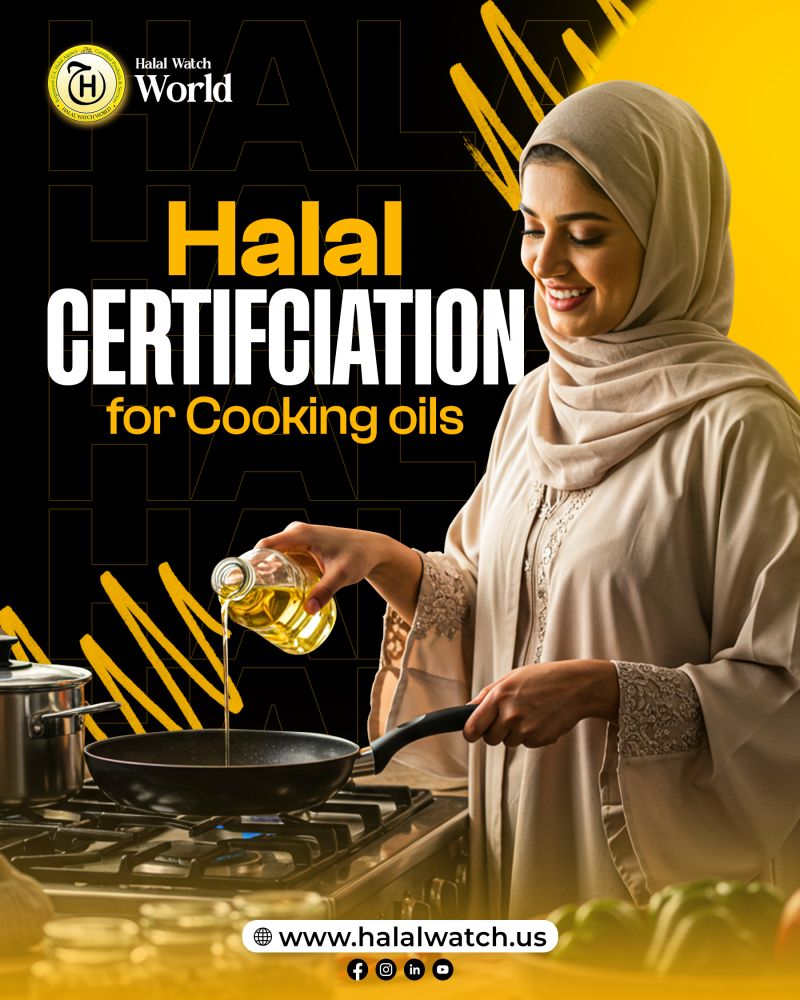Table of Contents
Understanding Halal Certification for Cooking Oils: A Comprehensive Guide for Food Industry Professionals

Summary
Halal certification for cooking oils extends beyond using plant-based ingredients to encompass the entire production process, from raw material sourcing to final packaging. While most vegetable oils are inherently permissible, achieving certification requires rigorous documentation of processing equipment, verification of all additives and preservatives, and maintaining supply chain transparency through accredited certification bodies. With the global halal food market projected to reach $2.6 trillion by 2030, proper certification opens significant market opportunities across Southeast Asia, the Middle East, and Western markets with Muslim populations. For food industry professionals, investing in halal certification represents not just compliance but a strategic advantage that builds consumer trust and unlocks access to one of the world’s fastest-growing food segments.
As global food markets continue their unprecedented expansion, halal certification has evolved from a niche requirement to a strategic business imperative. The halal food industry, projected to reach $2.6 trillion by 2030, represents one of the fastest-growing segments in the global food sector. For manufacturers and retailers in the cooking oil industry, understanding the nuances of halal certification can unlock substantial market opportunities while building trust with over 1.8 billion Muslim consumers worldwide.
The Foundation: What Makes Cooking Oil Halal?
At its core, halal certification for cooking oils ensures that products comply with Islamic dietary laws as outlined in the Quran and Hadith. The term “halal” means permissible, and for cooking oils, this encompasses not just the source materials but the entire production process from farm to bottle.
While the concept might seem straightforward—most plant-based oils are naturally halal—the reality involves complex considerations throughout the supply chain. The distinction between a genuinely halal-certified product and one that is simply “suitable for Muslims” lies in verified compliance, documented processes, and ongoing oversight by accredited certification bodies.
Source Materials: Beyond Natural Ingredients
The journey toward halal certification begins with source materials. Cooking oils derived from plants such as olive, sunflower, canola, corn, and soybean are inherently permissible under Islamic law. However, the halal status of the final product depends heavily on what happens during and after extraction.
Seeds and raw materials must be sourced from suppliers who can provide clear documentation about their cultivation and harvesting practices. This includes verification that no prohibited substances were used during growing, such as certain fertilizers that might contain animal-derived components. Additionally, the storage facilities for raw materials must be free from contamination by non-halal products.
The extraction process itself requires scrutiny. Cold-pressed oils generally present fewer concerns than those processed using chemical extraction methods, as the latter may involve solvents or processing aids that require halal verification. Each chemical used in the refining process must be traced to its source and certified as halal-compliant.
Processing Equipment: The Critical Factor
Perhaps the most complex aspect of halal certification for cooking oils involves the production equipment and facilities. In an industry where efficiency and cost-effectiveness often demand shared production lines, maintaining halal integrity requires meticulous planning and documentation.
Production facilities that process both halal and non-halal products must implement rigorous cleaning and sanitization protocols between production runs. These protocols, known as “halal assurance systems,” must be documented, validated, and regularly audited by certification bodies. The cleaning process typically involves multiple stages: physical removal of residues, chemical cleaning with approved agents, and thorough rinsing with water.
Storage tanks, pipelines, filling equipment, and packaging machinery all fall under this requirement. Even temporary storage containers used during production must be dedicated to halal products or subjected to approved cleaning procedures. This level of detail extends to the lubricants used in machinery, which must be food-grade and halal-certified to prevent any possibility of contamination.
For companies building new facilities or upgrading existing ones, investing in dedicated halal production lines can significantly simplify the certification process and strengthen market positioning. While this represents a substantial capital investment, it eliminates the complexity of constant line changeovers and reduces the risk of certification violations.To learn more about the official guidelines and best practices, visit Halal Certification Guidelines by JAKIM (Malaysia’s Department of Islamic Development)
Additives and Preservatives: Hidden Challenges
The additives used in cooking oil production present some of the most significant challenges for halal certification. Modern cooking oils often contain various additives to enhance shelf life, prevent oxidation, improve clarity, or modify flavor profiles. Each of these ingredients requires individual verification.
Anti-foaming agents, commonly used during the deodorization process, may be derived from animal sources or synthesized using non-halal processing aids. Antioxidants such as TBHQ (tertiary butylhydroquinone) or BHT (butylated hydroxytoluene) must be verified as synthetic or plant-derived, with no animal-based carriers or processing aids.
Emulsifiers, which help blend oil-based and water-based ingredients in certain specialty oils, pose particular challenges. Lecithin, a common emulsifier, can be sourced from soybeans (typically halal) or eggs (requiring verification of source). More problematic are mono- and diglycerides, which may be derived from animal fats or plant sources—a distinction that requires detailed supplier documentation.
Even seemingly innocuous additives like vitamin E (tocopherols) used as natural antioxidants require certification, as their carriers or extraction processes might involve non-halal materials. Natural flavoring agents, increasingly popular in specialty cooking oils, must be scrutinized for their source materials and production methods.
Supply Chain Transparency: Documentation is Everything
Achieving and maintaining halal certification requires unprecedented supply chain transparency. Every ingredient, no matter how minor, must be traced to its source. This includes not just the primary oil components but also processing aids that may not appear on the final label.
Certification bodies require comprehensive documentation including supplier declarations, material safety data sheets, production flow charts, and ingredient specifications. This documentation must be current, verified, and readily available for audit. Companies typically implement dedicated software systems to manage this information and ensure nothing falls through the cracks.
Supplier management becomes particularly critical. Raw material suppliers must either hold their own halal certifications or provide detailed documentation proving their products meet halal requirements. This often means engaging with suppliers who may be unfamiliar with halal requirements, necessitating education and sometimes long-term relationship building.
Traceability extends to packaging materials as well. Labels, adhesives, inks, and even the materials used in bottle manufacturing must be verified as halal-compliant. While plastic bottles are generally acceptable, any coatings or additives in the packaging materials require verification.
Certification Bodies: Choosing the Right Partner
Not all halal certification bodies are created equal. The global landscape includes hundreds of certifying organizations, but recognition and credibility vary significantly across markets. For cooking oil manufacturers targeting international markets, selecting certification bodies recognized in key consumer markets is essential.
Reputable certification bodies typically hold accreditation from international halal standards organizations and are recognized by importing countries’ halal authorities. They employ trained auditors who understand both Islamic jurisprudence and food manufacturing processes, ensuring that certification reflects genuine compliance rather than superficial paperwork.
The certification process typically involves an initial application and document review, facility inspection, product testing if necessary, and ongoing surveillance audits. Annual recertification is standard, with unannounced inspections possible at any time. This rigor ensures that halal status is maintained continuously, not just at certification time.
Market Impact and Business Opportunities
The business case for halal certification extends well beyond serving Muslim consumers. In many markets, halal certification has become synonymous with quality, purity, and ethical production practices, appealing to broader consumer segments including those seeking clean-label products.
Southeast Asian markets, particularly Indonesia and Malaysia, require halal certification for cooking oils sold in mainstream retail channels. Middle Eastern countries have varying requirements, with some mandating certification while others accept it as a competitive advantage. Even in Western markets with significant Muslim populations, halal certification increasingly influences purchasing decisions.
The premium pricing potential for halal-certified cooking oils varies by market but can range from 5-15% over non-certified alternatives. More importantly, certification opens access to institutional markets including restaurants, food service operations, and food manufacturers who require halal ingredients for their own products.
Implementation: Practical Steps Forward
For companies considering halal certification, success requires commitment from top management and integration into quality management systems. The process begins with gap analysis—identifying current practices that don’t meet halal requirements—followed by systematic remediation.
Training programs for staff at all levels ensure understanding of halal requirements and their importance. Production staff need to understand contamination prevention, quality assurance teams must manage documentation, and purchasing departments require knowledge of supplier evaluation criteria.
Investment requirements vary based on current operations. Companies with clean, plant-based product lines may achieve certification relatively quickly with modest investment. Those operating mixed production lines or using questionable ingredients face more substantial changes and associated costs.
Conclusion
Halal certification for cooking oils represents both an opportunity and a responsibility. As markets globalize and consumer awareness increases, certification has moved from optional to essential for companies serious about international growth. The investment in proper systems, documentation, and ongoing compliance pays dividends through market access, consumer trust, and operational excellence that benefits all products, not just those marketed to Muslim consumers. For food industry professionals, understanding these requirements today positions companies for success in tomorrow’s increasingly interconnected global marketplace.
Additional Resources
Official Government & Regulatory Bodies:
- JAKIM – Department of Islamic Development Malaysia – Malaysia’s official halal certification authority
- USDA Food Safety and Inspection Service (FSIS) – U.S. federal oversight for meat and poultry halal requirements
- U.S. Food and Drug Administration (FDA) – Federal food safety regulations
- USDA Food and Nutrition Service – Halal Foods Information – Guidelines for halal foods in federal programs
Is Your Product Ready for Halal Certification?
Get a Free Expert Evaluation Today
Discover if your ingredients, processes, and facilities align with Islamic dietary laws.
Start your Free Halal Compliance Check now — no obligation!

